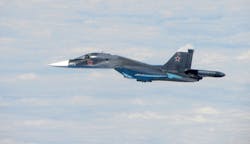How high-tech weaponry might play out in Russia's invasion of Ukraine
THE AEROSPACE AND DEFENSE BLOG – Will the invasion of Ukraine be a demonstration of the state-of-the-art in Russian military technology? Perhaps, but I'm still waiting for reports of decisive use of advanced-technology weapons such as electronic warfare (EW), cyber warfare, and navigation warfare that would offer crucial advantages to advancing Russian military forces.
It's clear that conventional Russian armored combat vehicles, maritime forces, and air forces have led the Russian advance into Ukraine, leaving widespread military and civilian damage in their wakes. Still, there have been few, if any, widespread reports of Russian high-tech weaponry that I've seen.
This is not to say that the best of Russian military technology won't be on display before fighting ends in Ukraine, but the longer this war drags on, the more likely we'll see deployment of some surprising Russian military weaponry.
It's anyone's guess what this relative quiet in the use of high-tech Russian military technology might mean. There's certainly a lot of speculation out there. It might political, in that Russia commanders may be reluctant to unveil their most promising technological developments in what until now remains a regional conflict.
Related: U.S slaps technology export ban on Russia
It may be that Ukraine's military forces do not pose a serious enough technological challenge that would provoke the Russian military from bringing out its most impressive weaponry.
It also may be -- but probably isn't likely -- that Russian military leaders just don't have the sophisticated and high-tech weaponry that Western analysts had expected. I wouldn't take that one to the bank.
So what we know after nearly a week of the latest Russo-Ukrainian War? Russian conventional forces have attacked Ukraine on three sides and made some substantial advances from Crimea in the south, Russia in the east, and Belarus in the north.
Russian land and air forces have destroyed civil power plants and oil facilities, as well as military airfields. Russian naval forces obliterated Ukrainian forces on Snake Island in the Black Sea. There are Russian or Russian-backed forces that have crossed the vital Dnieper River in the north, and hold ground on both sides of the river near the capital Kyiv.
Still, the far west of Ukraine is virtually untouched, which provides plenty of opportunity for a tactical retreat, if necessary -- provided that large pockets of Ukrainian resistance are not surrounded and destroyed. The capital Kyiv still stands, although it's heavily threatened. It's unlikely, however, that the loss of Kyiv would lead directly to the surrender of the entire country.
One thing's coming clear: invading and subduing Ukraine has not been so easy or so quick as the Russian high command might have believed. Every day that Kyiv holds out casts Russia more deeply into the role of global pariah. More of the world's governments are sending financial and material support to Ukraine. International financial sanctions on Russia haven't started to bite yet, but it's only a matter of time until they do. Switzerland and other countries are pledging to freeze Russian financial assets, sports teams refuse to take the field against Russian teams, and the list goes on. The longer the war drags on, the worse it will be for Russia internationally. If Russia hasn't yet taken a status similar to North Korea and Iran, then it's not far off.
As long as the Ukrainian flag flies over Kyiv -- or over even over isolated surviving outposts in that country -- the tougher the situation becomes for Russia ... which brings us back to that Russian high-tech weaponry we haven't heard much about yet.
Russian can afford little tolerance for delay, and the longer this war goes on, the more likely we'll see use of advanced military technologies like electromagnetic warfare, large-scale cyber attacks, attempts to destroy or disable Ukraine's position, navigation, and timing (PNT) assets. I'd rather not even think about the potential use of nuclear, biological, or chemical weapons yet. God forbid.
We'll have to wait to see how events unfold in Ukraine.
About the Author
John Keller
Editor-in-Chief
John Keller is the Editor-in-Chief, Military & Aerospace Electronics Magazine--provides extensive coverage and analysis of enabling electronics and optoelectronic technologies in military, space and commercial aviation applications. John has been a member of the Military & Aerospace Electronics staff since 1989 and chief editor since 1995.
